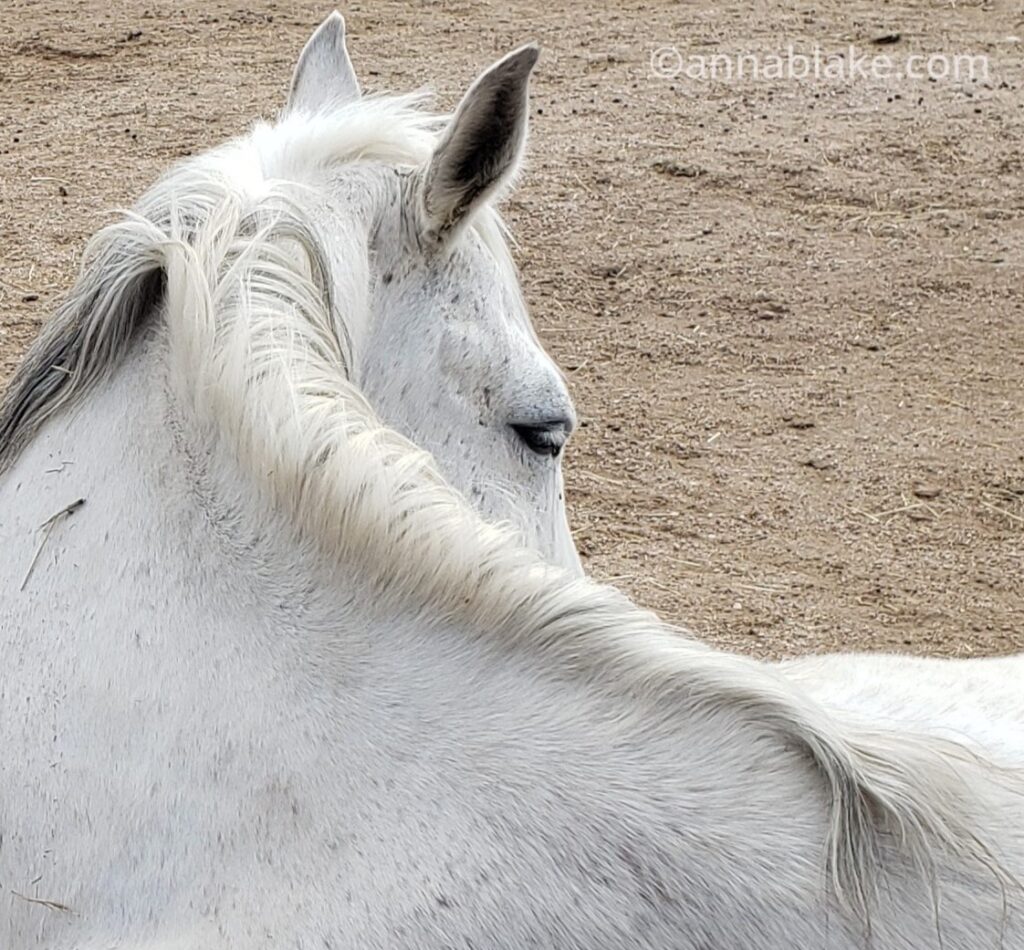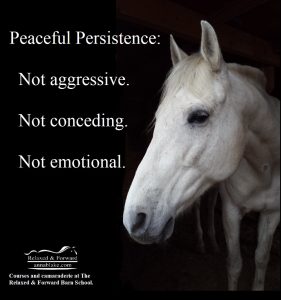
Humans, aren’t we swell? Compared to horses, we have dim, frail senses, we’re seven times slower in our response time, and we have the focus of a toddler in a toy store. Horses might give us a paternalistic nod at this point, except for our biggest failing. We have that pesky prefrontal cortex. So, we think too much and we’re sure we’re right. It would be great if we wanted to dominate horses, but alas. We say we want a partnership, even after it dawns on us that means two voices, one of them our horse. Now, we are just floating in the nebulous abyss of “What do I do now?”
There’s a time-worn adage that if you are with a horse, you are training them. Considering how close horses focus on our every move and how strong their memory is, it would be easy to overreact. Then it’s like we immediately take away our horse’s TV privileges and start teaching Latin. We hyper-train and make every moment teachable. Yawn. We have a trailer full of training aids, we become deadly serious, and now the horse is dragging his toes to the arena. The reason that resolutions about training don’t work is that they stink of boot camp. Then there’s another adage, less is more. But just sitting in a lawn chair feels too disconnected.
Most of us are stuck trying to find some middle place, not too extreme in either direction. If we weren’t lost in self-scrutinizing, we might notice horses are in the same place. They don’t want endless punishing and drilling; most have been repetitively over-trained and intimidated. They have already been to boot camp. More likely, horses need to recuperate from training. If we care about their mental health as much as their physical health, then we slow it all way down. Horses need time to process emotions once we stop dictating. So, we let it be a democracy where we all have a vote. Given the space, they might surprise you and volunteer in a way that takes a minute to recognize. Right after that, you are never the same. It’s like discovering an alternate reality where horses are our equals.
The price of admission is waiting out the time between when we stop droning on and when they finally use their bodies to tell us something. Horses won’t interrupt us, so there will need to be a gulf of silence. We acknowledge that it might even look worse for a while because change is messy. The pendulum will swing. It’s having patience while the horse finds his voice, and then letting them air old emotions out like laundry on a line, to be cleaned by the wind.
If it’s a young horse, confidence is the goal. Letting him be curious and brave without micromanaging his answer, so his foundation is stronger, even as it takes longer to build. A reactive horse might be stuck in their fear and anxiety. They need time to scream it all out. A stoic horse might need the courage to find their voice and the confidence to speak up. An old horse might have been talked over for so long that he forgot he had a voice. A rescue horse needs more time than others, until they feel truly home, finally safe. This goes quicker if we smile, say good boy, and take nothing personally. Call it affirmative waiting.
We’ve had the proportions wrong. When we think about training, we see it as a pinnacle, a mountain to climb. The horse’s mental health might be a meadow if we could find one. In reality, training is more like the tip of the iceberg and the horse’s emotional wellbeing is a hundred times more massive and just below the surface. We can see it through their eyes, bottomless and dark.
We play a part, but it’s a supporting role. It’s our job to trigger the horses lightly by asking a question. We do that naturally, effortlessly, by being a human. It might be as simple as haltering or standing at the mounting block. They remember what comes after, something unpleasant, and anxiety comes howling back like wolves nipping at their heels. We have to teach ourselves that this is an opportunity. We would rather just ride. Instead, we give them time to process. We can’t fix horses, but we can make a safe place for them to do it.
It’s dull. When I was younger, I thought I thought patience and procrastination were the exact same thing. My mentor said I had too much blood in my eye. That my red-hot desire blinded me. My horse agreed.
I had to learn that having an investment in the answer changed the question.
Another adage: We don’t train the horse. We train ourselves. And chestnut mares have nothing on us. In fact, it might take one to get our attention. Because the soul of horse training is waiting affirmatively. It takes a lot more energy than sitting in a chair. It’s holding a focus that is soft and not letting yourself get distracted. It’s accepting the horse’s answer and affirming them with calming signals. So, we train ourselves first by learning another language than what we have always used. Then we soften our bodies and just say yes. Open to the conversation having two voices.
Think of a parent playing legos with their child, never placing one themselves, but engaged in cheering their child on. And never checking their cell phone once.
Horses are not naturally resistant. They want to work with us. Donkeys think it shows poor judgment, but horses will always err on the side of trying too hard. Then they get tangled up when we get in their way, contradict ourselves, or get in a hurry. We forget that horse training means letting the horse do it. We suggest a topic, but then the horse does the task, while we cheer.
Most often, we change the question before the horse answers. We absentmindedly adjust their forelock. We pet their flank as if someone putting a hand on our belly wouldn’t distract us. We teach our horses to share our anxiety about the trailers by clock-watching. As if they can’t hear our emotions simmering, like a foot tapping impatiently.
Affirmative waiting is breathing in, exhaling out, and staying easy on the earth and alive in the question, ready to say yes at any effort. Of course, intimidation would be quicker and easier. Instead, we encourage the horse to answer confidently, without fear. Our challenge isn’t if the horse does the task. It’s can we calmly and lightly ask the right question. Can we support their mental health and be the focused partner our horse needs?
…
 Available Now! My new travel memoir is Undomesticated Women, Anectdotal Evidence from the Road. Ride along with us on a clinic tour through 30 states, 2 oceans, and 14k miles with me and my dog, Mister. It is an unapologetic celebration of sunsets, horses, RV parks, roadkill, diverse landscapes, and undomesticated women. Available now at Amazon, Barnes and Noble, and signed copies from me.
Available Now! My new travel memoir is Undomesticated Women, Anectdotal Evidence from the Road. Ride along with us on a clinic tour through 30 states, 2 oceans, and 14k miles with me and my dog, Mister. It is an unapologetic celebration of sunsets, horses, RV parks, roadkill, diverse landscapes, and undomesticated women. Available now at Amazon, Barnes and Noble, and signed copies from me.
…
If you or your horse appreciate what I write, please Subscribe to this blog or join us at The Barn School. To follow Bhim’s Training Diary, click here.

Want more? Become a “Barnie.” Subscribe to our online training group with affirmative demonstration videos, audio blogs, daily quotes, free participation in “group lessons”, and live chats with Anna. Become part of the most supportive group of like-minded horsepeople anywhere.
Anna teaches ongoing courses like Calming Signals and Affirmative Training at The Barn School, along with virtual clinics and our infamous Happy Hour. Everyone’s welcome.
Visit annablake.com to find archived blogs, purchase signed books, schedule a live consultation, subscribe for email delivery of this blog, or ask a question about the art and science of working with horses.
“staying easy on the earth”….I love that. This good kind of horse training reminds me of what it’s like to have really good therapist. Not easy to find 🙂
Not easy to be… but training is an art. Thanks, Vicki
This reminded me of the challenge of also noticing what doesn’t happen. Just yesterday Annie, a young mare who is quite confident and often pushy, stood quietly a short distance away while I guarded an elder mare trying to eat her extra meal. Sometimes I’m not able to keep the elder protected in another pen while she eats, so I was anticipating a struggle with Annie over the elder’s bowl. To my astonishment, Annie did not make any advance toward us, calmly nibbling on a bit of alfalfa I had tossed. I continually praised her, telling her what a good girl she was, though at first I worried that she would take my response as an invitation to step forward. I felt so happy that she was learning to remain calm, and that I noticed it as a “thing” rather than just being glad she didn’t bother me. If that makes any sense at all!
Perhaps she isn’t confident, but rather anxious and pushy. Staying calm is confidence. So yes, an improvement and a good point. We need to cheer success! Thanks Susan
Love this — taking the idea of affirmative waiting with me to the barn this morning to see my four-year old. 💕
Wishing you wonderful years of waiting for him. Thanks, Sarah
I loved ‘yawn’ and ‘sitting in a deck chair’-too funny! I don’t know if my ponies really think this way, I sort of hope not! They do what I ask and, since I keep asking and visiting with them daily, It’s all good. Thanks for sharing.
Thanks Susan
Waiting has never come naturally to me, I need to constantly remind myself to breathe and wait. I have gotten a bit better over the years but I too occasionally have “Too much blood in my eyes”.
Lots of times too much blood is a good thing… now I use it in my breathing. Thanks Peggy.
“…our biggest failing. We have that pesky prefrontal cortex. So, we think too much and we’re sure we’re right.” Well worth plagiarizing.
Heheheh. Not bragworthy, is it? Thanks, Chaz.
Reminds me of the Bruce Lee quote that goes something like this, “Patience is not passive. On the contrary, patience is concentrated strength.” In any case, I could use a lot more of it myself. It is a difficult practice.
So True. It takes so much more focus and strength to train with kindness. Thanks Mary Lynne
“Anticipation
Anticipation is making me late
Is keeping me waiting” ~Carly Simon
I always had been able to wait. It was the anticipation while waiting that did me and my horse in. Looking back on it, my anticipation was being negatively projected on to Dover and I never knew it. Happily, after I stopped “training” is when things got a whole lot better partnership-wise. I think Affirmative Waiting is a wonderful way to partner with your horse. Many thanks for this week’s wonderful newsletter, Anna.
Great comment, Lynell. I do think we are one person mucking and another person “training.”
“We can see it through their eyes, bottomless and dark”. This hauntingly describes my rescue, Noche (Ferd’s older brother). When I decided to bring him home, I initially read his body language as “I need a friend that I can trust”. However, in the 5 years he’s been with me, I have failed to inspire his trust despite my efforts. A recent bout of lameness brought a request from my Vet to lunge him so she could evaluate his gaits. I told her that doesn’t work, but I can turn him loose in the arena and ask him at liberty. Well, after walking him to the arena, removing his halter, taking 1 step back, and asking for a walk by a verbal cue and raising my hands 6in., he exploded. I was shocked, horrified, and angry as it was a close call with his rear hooves by my face. I have been thinking on it for days and after reading this piece, I finally see the light at the end of the tunnel. “He needs to scream it all out”. Thanks Anna, for giving me the fortitude to carry on.
Yes. Laurie, I feel like I’ve said some version of “it’s not about you” before, and it’s hard to believe (says the woman 10yrs into trying to win the trust of a certain horse). Thanks, Laurie. And so, we flounder on. Yay.
Another great blog that I read with renewed attention now that we have Gus. He is a seven-year-old Rocky Mountain but has barely been ridden. He is Addie’s 1/2 brother and belonged to Tom & Tina who lost Sam this past week. Gus is such a good boy. He has a lot to learn but has huge “try.” I’ve always considered myself a patient person, yet on reading your blog realize that I hate to wait. Hmmm. I’m determined to have all the wait Gus needs to have only affirmative experiences in his training. He is a welcome addition to our herd.
I wondered if he came to your barn. And I have to smile for the things you and I have in common. All of the time management and focus on finish we have that gets books finished are flat out no help in the barn. That said, I know you are a good listener and you have a solid herd, so congrats to Gus for a soft landing. Best wishes to all of you in the New Year.
Much wisdom in these differences between humans and equine friends.
Thank you, Nancy.
I’ve been reading/studying Joe Camp lately. He & his wife have what they call “no agenda time” with horses that are new to their herd. Every day they take chairs or sit on hay bales in the paddock with the new horse, with a mason jar of wine or cups of coffee, spread a few bits of alfalfa about not too far away and then just sit, watch the sun set or rise and visit amongst themselves – totally ignoring the horse. Some horses only take a couple days and some take many many more days – every horse is different but they all do eventually come to initiate a relationship. In their own time of their own accord. It’s just such a simple, beautiful way to start your relationship with a horse. It all comes back to “take the time it takes…”, setting the tone of patience. It’s directly in line with Anna’s work with Bhim.
I don’t know Joe Camp, but I agree it will always take the time it takes. I think muck time is the best. Thanks, Sueann